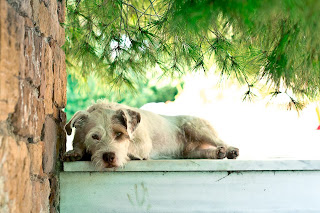The
Acropolis Crew
by Anna Stamatiou
As a
Trustee of GAWF/Animal Action who lives in Athens, I have daily first-hand
experience of what life on the streets is like for stray dogs in the city
centre.
Sotiris,
Kessaras, Goofy, Prokopis, Liza and Brave hang out where the buses that
empty loads of tourists coming to visit the Acropolis stop. They guard their territory with passion, and
have developed certain behaviours that may be unique to the packs that live at
archaeological sites all over Greece.
For instance, they will temporarily adopt and “shepherd” groups of
tourists, walking along with them and guarding them from any other dog, and
even from passing joggers! Their freewheeling lifestyle has its highs and lows
and they definitely add “a certain something” to the experience of taking a
walk on Philopappos hill!
 |
| Sotiris |
Sotiris
is the cranky leader of the pack. Every
afternoon he watches out for the ladies that come to feed him and the rest of
the crew. You don’t want to approach him
when they are around, as he is likely to snarl and snap. Prokopis
is usually mild mannered – except when he spots my dog, Jelhi, who he has taken a particular dislike to. Even though I regularly bribe him with a
little treat, he is always keen to chase her off his patch, and poor Jelhi watches out for him and gives him
as wide a berth as she can. If he spots
her, there is a flurry of large blackness seeing off some rather pathetic,
whiteness amid lots of noise, but never any real damage. Shaggy, grey Goofy used to be a playful pup but now he has become a bit of a
loner. Poor Liza got run over by a car, and for a long time couldn’t put one of
her feet to the ground, as it was so badly mashed.
 |
| Brave |
We often
think of strays in Athens as hungry, bony waifs but the Acropolis Crew is very well
(over) fed by a self-appointed team of caring, local ladies. My two dogs have discovered the places where
the ladies leave the dried food they bring, and it’s an everyday battle to keep
them away from any leftovers. The Crew
knows where there are taps that drip even in the Summer. So its basic needs are met.
 |
| Goofy |
The
system breaks down when veterinary care for strays is needed. Liza’s horrible injury went untreated for
days, while elderly Jack, now no longer with us, had the most enormous tumour,
the size of a football, under his chin, which no one would take responsibility
for. Local opinion was fiercely
divided. Some people wanted to see him
operated on, others felt he should be gently put down, still others felt nature
should be allowed to take its course. In
the end he was taken to the vet – far too late – and an operation was carried
out. Jack didn’t survive the strain of
it.
On the
upside, all these dogs are free to come and go as they please, but I’m not
looking forward to the next time one of them needs treatment for any serious
condition.
Please visit www.gawf.org.uk and make a donation to help us save dogs like poor Jack in future.
Please visit www.gawf.org.uk and make a donation to help us save dogs like poor Jack in future.


